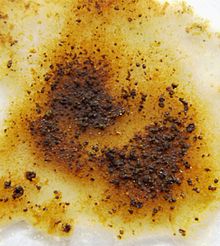
| |
| Names | |
|---|---|
|
IUPAC name
Copper(II) azide
| |
| Other names
Cupric azide
| |
| Identifiers | |
3D model (
JSmol)
|
|
| ChemSpider | |
PubChem
CID
|
|
| UNII | |
CompTox Dashboard (
EPA)
|
|
| |
| |
| Properties | |
| Cu(N3)2 | |
| Molar mass | 147.586 g/mol |
| Appearance | brown orthorhombic crystals |
| Density | 2.6 g/cm3 |
| Melting point | Explodes when heated |
| Hazards | |
| GHS labelling: | |


| |
| Danger | |
| NFPA 704 (fire diamond) | |
| NIOSH (US health exposure limits): | |
PEL (Permissible)
|
TWA 1 mg/m3 (as Cu) [2] |
REL (Recommended)
|
TWA 1 mg/m3 (as Cu) [2] |
IDLH (Immediate danger)
|
TWA 100 mg/m3 (as Cu) [2] |
| Related compounds | |
Other
cations
|
Lead(II) azide Silver azide Sodium azide |
Except where otherwise noted, data are given for materials in their
standard state (at 25 °C [77 °F], 100 kPa).
| |
Copper(II) azide is a medium density explosive with the molecular formula Cu( N3)2.
Uses
Copper azide is very explosive and is too sensitive for any practical use unless handled in solution.
Preparation
Copper azide can be prepared by a metathesis reaction between water-soluble sources of Cu2+ and azide ions. ( Spectator ions omitted in reaction below).
- Cu2+ + 2 N−3 → Cu(N3)2
It can be destroyed by concentrated nitric acid to form non-explosive products, these being nitrogen, nitrogen oxides and copper(II) nitrate.
References
- ^ Lide, David R. (1998), Handbook of Chemistry and Physics (87 ed.), Boca Raton, Florida: CRC Press, pp. 4–55, ISBN 0-8493-0594-2
- ^ a b c NIOSH Pocket Guide to Chemical Hazards. "#0150". National Institute for Occupational Safety and Health (NIOSH).
